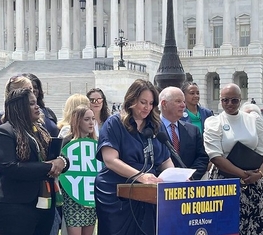How to Manage Disruptions at Public Events
Guidance on managing peaceful demonstrations or other disruptions at League public events.
Public League-hosted events, like candidate forums and learning sessions, are important opportunities that Leagues offer to members of their communities. They are also opportunities for peaceful protest or other disruption. This guidance will help Leagues prepare for and manage disruptions at their public events, either in person or virtually.
In-Person Events
1. As you’re planning your event, assess your risks
Identify and assess potential risks that could impact your event. You can develop different scenarios to identify risks and contingency plans. Consider leaning on your trusted partners to help assess risks and plan mitigation.
2. Once you have a plan, communicate clearly and proactively with your attendees, speakers, staff, vendors, partners, etc.
Share a plan that outlines the HOW, WHAT, and WHEN you will communicate in case of an emergency, disruption, or change of plan.
3. Ensure that you know who is in your audience and the space you’re in
It is a best practice to require RSVPs at all your events, even if they’re virtual, to ensure you know WHO and which organizations are in the event space with you. Also, make sure you understand any limitations of the space you’re in and communicate these limitations to your stakeholders. Example: if you are holding a forum at a library, the library might not allow chants, shouts, posters, etc.
4. As you’re preparing for your event, build a resilient team
Make sure that you identify leaders or volunteers who can handle stress and uncertainty, who understand the contingency plans, and who are equipped to de-escalate a situation with a disruptor. This group of volunteers should be the only one activated if a situation arises.
5. At the start of your event and at signs of peaceful disruption, share the rules regarding speakers, questions, and, if necessary, recording policies
Explain that the rules exist to allow candidates or participants to answer the same questions, clarify when questions will be allowed from attendees (if at all), and remind stakeholders of recording agreements. However, if attendees insist on recording the event or their disruption, do not feel as if you need to "police" this action. Do not attempt to force attendees to stop recording.
6. If disruption continues, explain what is next
Deploy your contingency plan, including calling for a recess/pause or a rescheduling of the event.
7. Just because you *can*, doesn’t mean you *should*
At in-person events, forcibly removing someone might have negative ramifications, including visuals that might get misinterpreted and disseminated. Make your plan very clear about what circumstances would require law enforcement to get involved — specifically situations that might impact the safety of people at the event.
8. Lastly, keep in mind that even the most disruptive person will usually have allies in the room, and be cautious of not stepping upon people’s freedom of speech.
Public events involving politics or political figures are legitimate opportunities for activists to exercise their right to make their voices heard. It's important to respect protesters’ right to free speech.
Virtual Events (Zoom)
Guidance coming soon!
Related Content
Leagues can use these LWV and VOTE411 branded digital backgrounds for virtual meetings.
Graphics for Leagues to use on social media, email, website, and to promote events and volunteer recruitment.
Guidance on deploying online voter registration technology at community events




